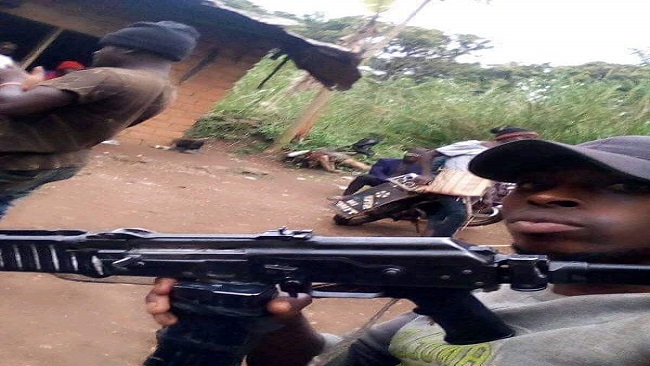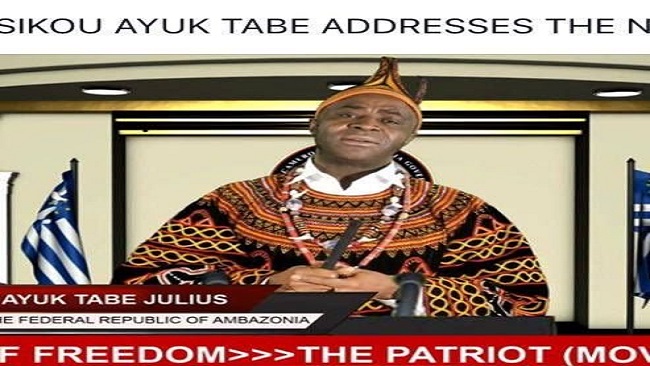7, August 2019
Day 8 Of Hunger Strike: Vice President Yerima Says Its Freedom Now Or Resistance Forever 0
Fellow Ambazonians,
I come to you with revolutionary greetings from your President, Sisiku AyukTabe and his team in the Principal Prison in Kondengui, Yaounde. Today marks the eighth day of their hunger strike.
Yesterday, Tuesday the 6th of August 2019, lawyers of the Interim Government reported to the President and his team that they had seen Comrades Macho Bibixy, Penn Terence, Tsi Conrad, Ngalim Felix, Babila Vena and other frontline leaders that have been unaccounted for since the peaceful prison demonstration on the 22nd of July 2019, asking for better living conditions or unconditional release.
We can confirm that they have now been returned to the central prison in Kondengui,Yaoundé. They have been abused in the most horrifying way known to man. They have all received multiple stitches from alarming cruelties. They have broken bones and multiple bruises. Some of them have lost some teeth. They have all suffered severe weight loss. But we thank God that they are all alive.
The attention has now been moved to Buea where progress has been slow. Our team of six lawyers have informed us that during the peaceful prison protests of 23rd July 2019 where political detainees were demanding for an improvement in their living conditions and unconditional release, the doors of the prison where opened by the authorities for the military to enter and kill comprehensively. Upon entering the prison, they shot at prisoners indiscriminately killing four and wounding over seventy-five. Of the four killed one corpse was carried and deposited at the Regional Hospital, Buea and the other three were carried away to an unknown destination. Nobody knows where they were deposited.
Five of the wounded were taken to the Regional Hospital where they are in critical conditions whilst the others are being managed within the prison medical wing. The French Cameroun authorities aren’t allowing our lawyers’ access to any of the political detainees. Our lawyers have confirmed that sixty political detainees were moved into an unventilated water torture chamber in the aftermath of the demonstrations. They were there until the 5th of August 2019. From the prison, our lawyers went to the Regional Hospital, Buea where they weren’t allowed to see the five political prisoners admitted there after their ordeal. During a short trip to the military court, they succeeded to discuss with some of the detainees who corroborated all the facts they have gathered.
Today, they will be informing the Prison authorities and the Minister of Justice of their intent to see the political detainees and the whereabouts of the three massacred comrades.
In all this sad public tragedy, the cruelty of the French Cameroun authorities is being laid bare for the world to see. For engaging in peaceful protests about their living conditions, our comrades have sustained life-threatening injuries, endured Nazi-style torture and lost their lives. The fact that the Cameroon authorities have considerable disregard for our lives strengthens our case for freedom and independence. Southern Cameroonians, rich or poor, educated or untrained should be under no illusions as to the enormity of the state-sponsored cruelty we face. The barbarisms ditched upon our comrades are not isolated incidents. They are well planned, rehearsed and authorized from the highest tier of Cameroun power.
Our President and his team have made it clear to the world that the hunger strike will only be called off after the lawyers’ confirmation of seeing all our political detainees or knowing the whereabouts of the massacred. This position hasn’t changed despite their frail bodies. Their bodies are frail but their minds and determination remain resilient. We must take inspiration from them. Our resolve and determination should not falter despite the turbulent times. The pressure on the French Cameroun authorities has paid some dividends but we must keep it up.
We must continue to make the case that this ill-fated fifty-eight years political experience can’t endure. It’s freedom now or resistance forever.
Thank You
Dabney Yerima, Vice President
Issued 7th of August 2019


























7, August 2019
Why Biya is desperate for school resumption in September 0
For about a month now, there has been more than ever before an intense campaign for school resumption in September. The local Ambazonian media have been given millions to join the campaign. CDC workers have been paid a month’s salary out of some one year of arrears owed them to ‘prepare for school resumption’.
Prominent Southern Cameroonians and social groups have also been paid huge amounts of money to plead to parents to send their children to school. Some French Cameroun government ministers who hail from Southern Cameroons like the Kupe Manueguba thug, Elong Paul Che and fraudster, Paul Tasong of Lebialem have also mobilized CPDM elite of their constituencies and accompanied by tight security, braved it to Southern Cameroons to hold meetings with parents.
The principal reason for the frenzied campaign is to prove to the world before the United Nations Security Council meets in September that school resumption is evidence that the situation in Southern Cameroons has ‘normalized’. The Biya Francophone regime is planning to use a successful back to school to oppose any possible United Nations intervention.
Ironically, it is the government itself making it impossible for effective resumption of schools. Several schools in Southern Cameroons have been transformed into French Cameroun military barracks. Many others have been burnt by Francophone Beti-Ewondo army soldiers while most teachers in Ambazonia have vamoosed into safety areas in La Republique du Cameroun.
A visit to the Kumba market by our Cameroon Concord News Group Meme County correspondent last week indicated that parents are not preparing for the traditional “back to school”. Unlike in the past when markets at this time of the year were clustered with school bags, uniforms, books and other didactic materials and parents hustling to buy, there is no such scenario. Kumba market is not an exception as reported by our correspondents across the entire Southern Cameroons.
Field reports by our reporters also indicated that both the Southern and Northern Zones of the now Federal Republic of Ambazonia are for the most part controlled by the Ambazonia Self Defense Forces with military jeeps plying occasionally. In the Southern Zone, only Kumba central, Limbe, Mutengene, Tiko and part of Buea are in the control of the French Cameroun government in Yaoundé.
It is because of the insecurity in Buea that the renowned Sasse college on the periphery of the Ambazonia historic headquarters has been moved to Tiko which is relatively save and children there who braved it to school last academic year did so without wearing their uniforms.
In the Northern Zone, the Ambazonia Restoration Forces are in command with the exclusion of Nkambe Central and Bamenda. Educational officials in the territory say over 80 percent of colleges have been closed down and teachers afraid to be kidnapped are nowhere to be found.
Schools that have not been burnt or destroyed are covered in grass one month to resumption and no teachers are there doing the enrolment. The military are still camping in many others. The war is flaring up and who is that parent who will send their kids to learn under such perilous conditions? Cameroon Concord News Group has challenged those doing the campaign for school resumption including Barrister Agbor Balla, Minister Elong Paul and Minister Paul Tasong to set an example by openly enrolling their kids in institutions in Southern Cameroons. No one has done that.
In that light, back to school in Southern Cameroons shall just be another fiasco of the Biya regime, like the botch hosting of the 2019 African Cup of Nations. For effective school resumption in their so-called one and indivisible Cameroon, President Biya who declared the war against his own people should call a ceasefire and convene an inclusive dialogue with all issues on the table as nations; international organizations and people of goodwill have been telling him. Or the UN should send in peace keeping force as it meets in September to prevent the barbaric violations of human rights driving refugees and asylum seekers into neighboring countries including Europe and America.
By Soter Tarh Agbaw-Ebai
Chairman/Editor-in-Chief
Cameroon Concord News Group